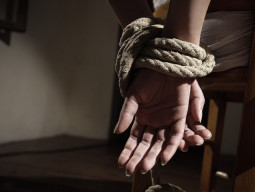LAHORE:
While the last execution in any Pakistani jail took place under former president, General (retd) Pervez Musharraf’s tenure in 2007 and the present PPP-led government kept issuing stay orders against all executions, the trend may have been reversed by the time you read this report in the morning.
A convicted prisoner was scheduled to be hanged in a jail in Mianwali city, northwest Punjab in the wee hours of Thursday (today), making him the first to be hanged during the PPP’s tenure, The Express Tribune learnt. No stay has been received by the facility that will hang him till late Wednesday night.
The death row prisoner, Muhammad Hussain, a soldier of the army and resident of Langarwala Pul of Sahiwal Tehsil Sargodha District, had killed his senior officer, Havaldar Khadim Hussain in 2008 when they were on leave.
Following this, proceedings to court martial him were initiated and he was tried in the military court in Okara Cantonment , which sentenced him to death on February 12, 2009, Deputy Superintendent (DSP) of Mianwali Jail, Muhammad Mansha told The Express Tribune.
Hussain had subsequently filed mercy petitions to the General Headquarters (GHQ) and the Chief of Army Staff, but they were rejected.
He also filed a mercy petition to President Asif Ali Zardari, but that was rejected too on December 30, 2011, DSP Mansha stated.
The GHQ then assigned the Corps Commander of Sargodha to fix the date of Hussain’s execution, which was set for November 15, 2012 (today).
All arrangements for the execution have been finalised because the jail has not received a stay order from the presidency as yet, DSP Mansha added.
He said Hussain met his relatives for the last time on Wednesday (yesterday).
Inspector General Prisons Punjab, Mian Farooq Nazeer, told The Express Tribune that the entire process regarding the execution is completed by the military officials and they only provide the Phansi Ghat (place of hanging) for the execution.
Nazeer also confirmed that this will be the first execution in the present government’s tenure.
Moratorium on executions not yet decided
There has been a de facto moratorium on executions since the PPP returned to power in 2008. In that year, former premier Yousaf Raza Gilani, in a meeting with Human Rights Watch, agreed to enforce a moratorium on executions and to commute death sentences of prisoners to life imprisonment. However, this has yet to happen.
Petitions for clemency
More than 500 petitions for clemency just for prisoners in Punjab are currently pending before the President, Nazeer revealed.
According to Amnesty International, 313 death sentences were handed out in 2011. But none of those convicted were executed.
According to Rule 101 of the Pakistan Prison Rules, “Every prisoner shall be at liberty to submit a petition to the government for clemency, and shall, if he desires, be accorded reasonable facilities for preparing and submitting such a petition.
Except in the case of a petition against the execution of death sentences, all such petitions must be accompanied by copies of the judgment of the court of conviction and of any superior court which may have dealt with the case on an appeal of reversion .These will be supplied by the petitioner(s) themselves:
Note 1: Once a petition for clemency has been rejected, no second or subsequent petition shall be forwarded to the provincial government for consideration unless there are fresh grounds, which the superintendent shall himself, certify quoting the previous references.
Note 2: While forwarding the petition for clemency of a prisoner, his/her mercy petition role on the prescribed form, along with a report by a medical officer on the present state of health of the prisoner shall also be sent. Any outstanding achievement gained by a prisoner, be it educational, in any industry etc, shall also be brought to the notice of the government.
Note 3: All petitions for clemency shall ordinarily be addressed to the governor of the respective province and shall be routed through the inspector general of prisons.
Rule 104(i): Immediately upon the receipt of intimation of the dismissal by the Supreme Court of his/her appeal, or application for special leave to appeal, or of the breaking down of his application for special leave to appeal, in case the condemned prisoner has made no previous petitions for mercy, the prison superintendent shall inform the condemned prisoner concerned that if he/she desires to submit a petition for mercy, it should be submitted in writing within seven days of the date of such information.
Rule 104(ii): If a condemned prisoner submits a petition within seven days, as prescribed by by Rule 104(i), the prison superintendent shall forthwith dispatch it to the home secretary of the provincial government, together with a covering letter reporting the date fixed for the execution by the sessions judge, and shall certify that the execution has been stayed, pending the receipt of the orders of the provincial government on the petition.
Published in The Express Tribune, November 15th, 2012.







































COMMENTS
Comments are moderated and generally will be posted if they are on-topic and not abusive.
For more information, please see our Comments FAQ